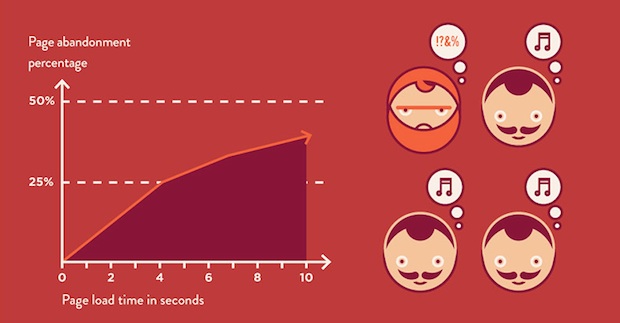source: http://digg.com/newsbar/topnews/how_one_second_could_cost_amazon_1_6_billion_in_sales

The data comes from an infographic compiled by OnlineGraduatePrograms.com, with the specific goal of finding out about tolerance of slow webpage speeds for the average U.S. web user. Then they extended the data to cover other habits that take time, like waiting in line or being served in a restaurant. It turns out that Americans are an astonishingly impatient lot. In fact, odds are they've probably all given up reading this by now. Holla, rest of the world!
Some of the statistics revealed by the study are mind-boggling in their demonstration of impatience. For example, one in four people abandons surfing to a website if its page takes longer than four seconds to load. That's just four "Mississippis," guys. Four in 10 Americans give up accessing a mobile shopping site that won't load in just three seconds (which is roughly the time taken to read to the period at the end of this sentence). Crazy, given that shopping sites tend to have to be image-centric, and thus may take longer to load.
The greater majority of Americans also won't wait in line (unless they have to, we're guessing, in places like the DMV) for more than 15 minutes. Fifty percent wouldn't go back again to an establishment that kept them waiting for something. So you'd better serve them swiftly the first time if you want their repeat commerce, no matter what Groupon deal you can cook up.
Surprising as all this may be, the implications of this impatience are even more shocking.Amazon's calculated that a page load slowdown of just one second could cost it $1.6 billion in sales each year. Google has calculated that by slowing its search results by just four tenths of a second they could lose 8 million searches per day--meaning they'd serve up many millions fewer online adverts.
Read the full infographic at the link here. And then realize that this may explain why Google is desperately trying, it says, to speed up search results with tweaks like Instant (and the new semantic search). It's also a blessing that tablet computers and smartphones get faster and faster every year (even more important when you learn 25% of Americans only surf the web on mobile devices!). It'll mean that tweaks like the better Fast Fourier Transform are still more important, as they're set to revolutionize the speed of computing. And thank heavens for LTE, that's all we can say.
But then we have to wonder. If Americans get used to today's speedier Internets, phones, and web technology, will they quickly demand still speedier computers and web designs? Will tomorrow's Amazon homepage have to travel back in time from when it's rendered in order to pre-arrive in a U.S. web citizen's eyeballs at just the right moment? Did we just blow your mind? That was fast.
=============================
vocabularies
dawdle vi.1. 閒混;偷懶;遊蕩
vt.1. 浪費(時間等)
boggle vi. 1. 遲疑;退縮 2. 驚奇;驚恐 3. 搪塞,推諉
vt. 1. 弄壞,搞糟 2. 使驚奇;使困惑
n. 1. 驚奇;猶豫;退縮
commerce n.[U] 1. 商業,貿易,交易
Our overseas commerce has increased a great deal.
2. (思想,意見,感情的)交流;社交
I have little commerce with my neighbors.
tweak n. 1. 扭;捏;擰 2. 苦惱,焦急
vt. 1. 扭;捏;擰
===========================
Q1: Would you surf a new website and feel bored when the page loading take more the 4 seconds? why or why not?
Q2: Even a click could influence the business in a 1.6 billion dollar way. Do you know any small detail in your own major that could influence the business in a great way? give us some ideas.


 留言列表
留言列表
